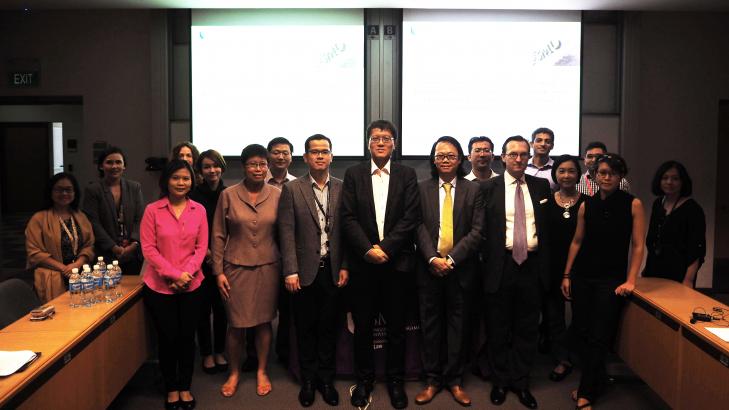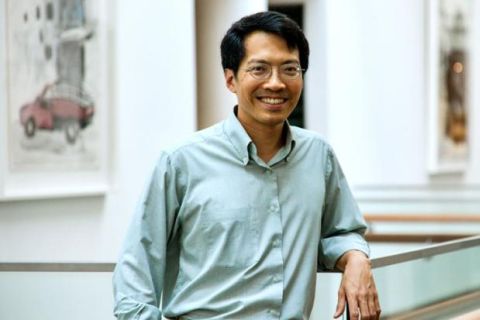
SMU’s Centre for Cross-Border Commercial Law in Asia organised a half-day seminar titled “Managing a Large-Scale Research Project: Enhancing Hong Kong’s Future as a Leading International Financial Centre” on 12 December 2014. Held at the School of Law, the objective of the seminar was to help faculty members understand the process of organising large-scale law projects with national and international impact, preparing grant proposals, securing grants from external agencies, and managing such projects.
The speakers were Professors Douglas Arner and Say Goo of the Faculty of Law at the University of Hong Kong (HKU). They are currently involved in a major 5-year project on enhancing Hong Kong’s future as a leading international financial centre, with a grant of over HK$13.5 million. Funded by the Hong Kong Research Grants Council Theme-based Research Scheme, the project involves 10 co-principal investigators, as well as many other collaborators from various disciplines (such as law, economics, finance, geography, and politics) and institutions, including HKU and University of Oxford.
Coordinator and principal investigator of the project, Professor Arner is an expert in economic and financial law, regulation and development. He is also the Co-Director of the Duke University-HKU Asia-America Institute in Transnational Law. Co-principal investigator Professor Say Goo is Director of the Asian Institute of International Financial Law (AIIFL) at HKU.
Each of them chaired a session at the seminar, with the other offering comments. Professor Arner led the first session, in which he gave practical tips about how to develop, organise and manage a research grant project. He emphasised the importance of understanding funding guidelines, developing a central research question, identifying potential collaborators, and hiring researchers. While traditionally legal academics might prefer to work on their own projects, Professor Arner observed that certain benefits could be derived from securing grants, particularly if such grants facilitate collaboration with other institutions and experts. Furthermore, academics could seek administrative support for project account and hiring-related matters if they were to involve research centres within their university.
As track records and past research collaborations form an important evaluation criterion in competitive grant applications, Professor Arner encouraged academics to gain experience through applying for smaller grants such as those offered within the university, before seeking larger grants from external agencies. Professor Goo added that having a track record pertinent to the research grant area of study would be extremely useful.
In the second session, Professor Goo focused on dissemination of project outcomes. He gave the example of how the AIIFL has an international network of institutions and experts on its advisory board. Through the institute, outcomes of research projects could be disseminated through its website, conferences, seminars and working papers.
Open to all within the SMU community and supported by the Office of Research, the half-day seminar attracted about 20 participants.
See More News
Want to see more of SMU Research?
Sign up for Research@SMU e-newslettter to know more about our research and research-related events!
If you would like to remove yourself from all our mailing list, please visit https://eservices.smu.edu.sg/internet/DNC/Default.aspx

